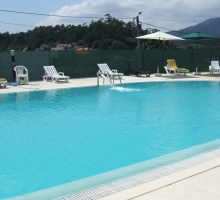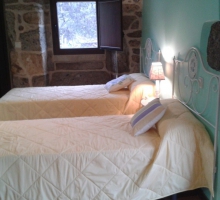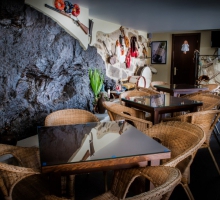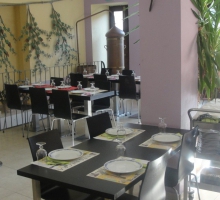The craft and its manifestations are part of our culture and losing it would be like losing a part of our identity.
Melgaço is a county full of traditions related crafts. The weaving in Flax, weaving in wool (blankets and carpets), the agricultural and canastros (typical construction to store corn) are some of the articles that make up the history of our secular County.
D. Rosa M.¿ was born in Mozambique, currently lives in Prado, belonging to the county town of Melgaço, near the village of the same name.
She presented a project, under the Leader (European founds), aimed at putting into operation a large area of sells of its products in the village of Melgaço.
The embroidery on clothing, towels, corridors are beautiful and diverse, some sober, arranged, and to examine them, we have the feeling of being with a work that belonged to the ancestors of a noble class. They are made of old flax and the reasons applied in the same tone or colour, are noble in some cases and others are kind of popular.
Among them, the famous costumes typical of this region, one of them, dressed in traditional female figure of the mountain village of Castro Laboreiro -, symbolizing, in their black robes, the grief, longing, the respect shown by those who departed : Husbands, lovers and children. Even today this dress is used.
Another characteristic figure, it’s the authors “Inês Negra” (Black Agnes), an historical and legendary figure of Melgaço which gave its name to the toponymy of the old town and who bravely took the strong square of Melgaço from the Castilians (Spanish), fighting body to body with the traitor, a Portuguese homeland woman, known as "arrenegada.".
Location: Melgaço
Melgaço is a county full of traditions related crafts. The weaving in Flax, weaving in wool (blankets and carpets), the agricultural and canastros (typical construction to store corn) are some of the articles that make up the history of our secular County.
D. Rosa M.¿ was born in Mozambique, currently lives in Prado, belonging to the county town of Melgaço, near the village of the same name.
She presented a project, under the Leader (European founds), aimed at putting into operation a large area of sells of its products in the village of Melgaço.
The embroidery on clothing, towels, corridors are beautiful and diverse, some sober, arranged, and to examine them, we have the feeling of being with a work that belonged to the ancestors of a noble class. They are made of old flax and the reasons applied in the same tone or colour, are noble in some cases and others are kind of popular.
Among them, the famous costumes typical of this region, one of them, dressed in traditional female figure of the mountain village of Castro Laboreiro -, symbolizing, in their black robes, the grief, longing, the respect shown by those who departed : Husbands, lovers and children. Even today this dress is used.
Another characteristic figure, it’s the authors “Inês Negra” (Black Agnes), an historical and legendary figure of Melgaço which gave its name to the toponymy of the old town and who bravely took the strong square of Melgaço from the Castilians (Spanish), fighting body to body with the traitor, a Portuguese homeland woman, known as "arrenegada.".
Location: Melgaço







